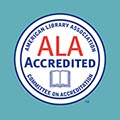Search
Master of Information
The design of the Master of Information (MI) program engages students from a wide variety of professional and academic contexts to focus on information: its creation, organization, classification, retrieval, preservation, management and use. Built upon the values and foundations of Library and Information Science, the MI program focuses on the integral relationships between people, information and technology.
Intense Preparation for a Dynamic Field
The MI program prepares students for careers and leadership in a broad range of information and technology fields and institutions, focusing on people-centered information professional practice, social good, creativity, innovation, and local and global reach with impact.
- 36-credit program
- 1.5 to 2 years with full-time study (at least 9 credits/term)
- 2 to 3 years with part-time study (fewer than 9 credits/term)
- 100% online option (not self-paced, but the format is asynchronous)
- Faculty actively engage within the virtual classroom through discussions, projects, lectures, group work, etc.
- On-campus classes meet once a week (currently working toward offering more on-campus courses)
Concentrations Span the Profession
The MI program offers areas of concentration built around your career goals.
Program Goals
The program prepares students for leadership in librarianship, archives, and information science careers by fostering future-focused knowledge, skills, and professional dispositions applicable across the information professions. Students may develop specialized expertise aligned with their career interests through MI Concentration Area courses in Librarianship, School Librarianship, Archives and Preservation, Data Science, Human-Computer Interaction, Health Information, Technology & Information Management, or by electing a “Design-Your-Own personalized study track with faculty guidance.
Outcomes
Through their learning experiences in the MI program, students will develop knowledge, skills/expertise and learn best practices in each of the following Outcome Domains:
1. Information Practices and Needs of Diverse Populations
Specifically, students will be able to:
-
Analyze the impacts of cultural, social, and demographic factors on information behaviors to understand diverse community needs, by applying foundational and new knowledge, theories, models, and concepts;
-
Evaluate information resources for cultural sensitivity and representation;
-
Identify, analyze and mitigate potential barriers to information access across diverse communities and environments served (physical, digital);
2. Effective, Fair, and Socially Responsible Organization and Design of Information Services, Systems, Technologies and Solutions
Specifically, students will be able to:
-
Create, evaluate, design, and test human-centered, inclusive information and technology systems and services, organizational structures, classification schemes, metadata, policies, etc. that support inquiry, discovery and knowledge-building;
-
Incorporate features and affordances that prioritize user privacy and agency, balance standardization with cultural responsiveness, and limit biases and exclusionary practices.
3. Key Democratic Norms, Standards, and Ethics integral to the Information Professions
Specifically, students will be able to:
-
Implement, evaluate, apply, and uphold ethically and democratically grounded policies and professional practices and standards in information work.;
-
Assess and implement policies and practices in information settings, demonstrating ethical adherence to democratic values and professional standards;
-
Demonstrate a commitment to intellectual freedom and equitable access across diverse communities.
4. Equitable and Sustainable Access to Information and Knowledge in Multiple Contexts
Specifically, students will be able to:
-
Disseminate, share and preserve physical and digital resources and keep services useful now and into the future, for all communities including those with limited broadband;
-
Assess the sustainability of information technologies and services that are good for the environment, make sense economically, and treat everyone equitably.
5. Evidence-Based Assessment and Evaluation of Information Systems, Programs and Services
Specifically, students will be able to:
-
Design and implement evidence-based measurable protocols and indicators to evaluate the effectiveness of information systems, programs, instruction, and services;
-
Translate findings into actionable strategies to measure impact and inform improvements;
-
Apply multiple research methods to analyze user experience data to identify and mitigate accessibility and equity gaps.
6. Responsible and Engaged Leadership in the Information Professions
Specifically, students will be able to:
-
Lead initiatives in the information professions by driving ethical, responsible, and equity-oriented practices;
-
Identify, articulate, and pursue leadership opportunities and ongoing learning at all levels within information organizations;
-
Create inclusive leadership and training opportunities, develop partnerships with communities and constituents, and implement approaches to institutional change that center equity and inclusion.
In Good Company
SC&I’s MI is one of the most respected programs of its kind and has a strong network of alumni professionals.
International Learning Opportunities
MI students have an opportunity to study abroad at Wroxton College.
U.S. News & World Report, 2025 rankings
SC&I’s MI program currently ranks
#6 Overall Program Nationally

Founding Member
The iSchools organization was founded in 2005 by a collective of information schools dedicated to advancing the information field in the 21st Century.
SC&I belongs to the iCaucus, the consortium’s governing group.

